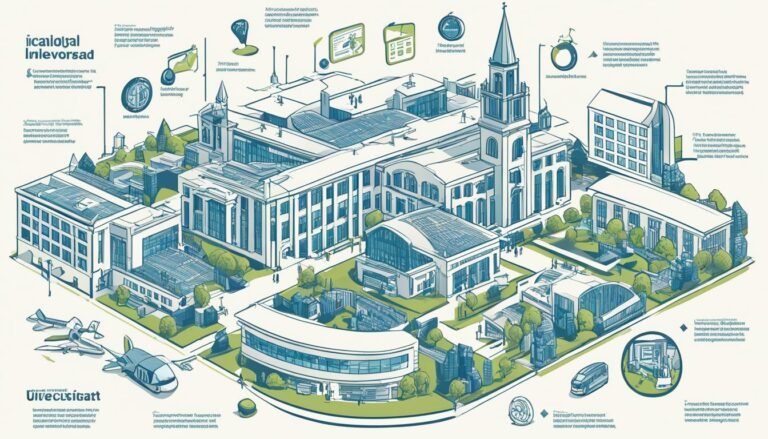Exploring Ireland’s Top Trade Schools: A Pathway to Specialized Careers
Have you thought about skilled trades as a stable and rewarding career path? They’re often overlooked when people think of university degrees. But, as views change, Ireland’s top trade schools show a world of specialized careers that are crucial for our economy.
Trade schools are a great alternative to traditional college. They focus on vocational training that meets industry needs. With university tuition fees reaching up to €27,000, many are choosing trade education for its practical skills.
This article will explore the importance of trade schools. We’ll look at the trades they offer and how they match up with jobs in Ireland. Join us to see how trade education leads to rewarding careers.
Key Takeaways
- Trade schools provide practical training for in-demand skills.
- Tuition fees for university programs can be prohibitive compared to trade education.
- Apprenticeships enhance employability through hands-on experience.
- Vocational training addresses critical skills shortages in Ireland.
- Trade schools prepare students for specialized careers in essential sectors.
- Skills like electrical wiring and plumbing are gaining renewed respect in the job market.
The Importance of Trade Schools in Ireland
Trade schools are key to preparing Ireland’s future workforce. They tackle the skills shortages in many industries. These schools give students the hands-on skills needed for jobs in skilled trades.
In Ireland, more young people are going for degrees. But trade schools offer a direct path to work for those looking for jobs now. They meet the growing need for skilled workers in areas like building, plumbing, and electrical work. These jobs are vital for Ireland’s economy.
Every year, about 200,000 learners get support from further education and training (FET). This shows how important trade schools are in our education system. The government invests around €800 million in FET, covering levels one to six on the National Framework of Qualifications (NFQ).
This shows how much trade schools matter in training a skilled workforce for Ireland’s job market.
The FET strategy runs until 2024 and focuses on three main areas: building skills, promoting inclusion, and helping different learners. It aims to help people re-skill and up-skill, especially after Covid. Trade schools prepare students for jobs and help bring people from all backgrounds together through education.
Trade schools are crucial for a strong post-secondary education system in Ireland. As the economy changes, skilled trades become more important. This makes trade schools key for a strong labor market.
What is a Trade School?
Trade schools, also known as vocational schools, are key for students looking into vocational paths. They offer hands-on learning and specific skills for various trades. Unlike traditional colleges, they focus on practical skills for jobs in fields like automotive, construction, and manufacturing.
These programs are usually shorter, lasting two years or less. Some students can finish in just a year. This quick training lets students start working sooner, in jobs like technicians, welders, and CNC machinists. Schools like UTI offer training that can be finished in 18 months.
Trade schools are often more affordable than traditional colleges. They offer focused training that leads to jobs quickly. After finishing, graduates often get entry-level jobs right away, making it easier to move from school to work.
Exploring Ireland’s Top Trade Schools: A Pathway to Specialized Careers
In Ireland, students find many trade schools that lead to exciting careers. The Institute of Technology offers programs that meet the job market’s needs. These programs focus on healthcare, engineering, and IT, giving students both theory and practical skills.
These schools work closely with the industry, helping graduates get jobs easily. They mix real-world examples into their courses. This prepares students for Ireland’s specialized careers. Encouragement to reflect on personal interests is key as students choose their paths.
Four out of five graduates from these schools get jobs quickly after finishing their studies. This shows how effective vocational training is in making students employable. Guidance counselors help by offering job shadowing and networking opportunities.
Students learn by doing lab work and using tools from the industry. This builds their confidence and skills. Exploring different interests and getting advice from trusted adults helps students make a good plan for their future.
Benefits of Vocational Training
Vocational training offers many advantages for one’s career. It focuses on developing skills that employers need, making it easier to start working quickly. Students get real-world experience that they can use in their jobs.
One big plus is the economic benefits. People who finish vocational programs can earn good wages and have job security. A study by Cedefop shows that vocational education boosts employability, income, and quality of life.
Vocational training also builds confidence in students by teaching them skills needed in the industry. This practical learning prepares students for the job market and helps them grow personally. It makes them ready and motivated for their careers.
Companies gain a lot from a skilled workforce. Cedefop’s research shows that investing in vocational training improves employee well-being and performance. This leads to a better workplace culture. It shows that vocational education is key for both personal and business growth.
Hands-On Learning: A Core Component of Trade Education
Trade education is all about hands-on learning. This way of teaching fits different learning styles. Unlike traditional classrooms, hands-on learning reaches out to visual, auditory, and kinesthetic learners. This makes it easier for students to succeed.
This method helps students remember skills and think creatively by using real-world examples. When students apply what they learn in real situations, it makes the learning stick. Doing hands-on tasks also improves critical thinking and problem-solving skills. This helps students handle job challenges better.
Trade programs give students real-world experiences that go beyond just reading books. They prepare students for the job world by making them familiar with career settings. Employers look for this kind of experience. It shows students have the skills needed for the job.
Trade education encourages creativity by letting students explore with tools and materials related to their chosen field. It’s a fresh way of learning that creates an active and engaging classroom. Schools that focus on this kind of learning help students get ready for their careers.
Types of Skilled Trades Offered in Ireland
Ireland has many skilled trades for different interests and skills. These options let people find careers they love and help the economy. The main skilled trades areas are electrical, construction, and automotive trades. We’ll look at each area to help students choose their path.
Electrical and Electronic Trades
Students can start courses in electrical trades to learn about installing, maintaining, and fixing electrical systems. They’ll learn about circuit design, safety, and using new technology. After graduating, they can work in homes, businesses, or factories. There’s a big need for skilled electricians, making it a great choice for newcomers.
Construction and Carpentry Trades
Construction trades include many roles, with carpentry being key. Those who like working with their hands can learn framing and woodworking. Courses might also cover green building and new construction tech. The construction field is growing in Ireland, offering many career paths for those who love building things.
Automotive and Mechanical Trades
Automotive trades teach students how to fix, maintain, and service cars and trucks. They’ll learn about diagnosing problems, electrical systems, and making cars run better. With more electric cars coming out, knowing about new car tech is a big plus. Automotive trades offer a lively career with chances to specialize in new areas.
The Role of Apprenticeships in Career Development
Apprenticeships are key in today’s career growth, especially in vocational training. They mix *hands-on experience* with classroom learning. This lets learners get real-world skills. In 2023, about 133,450 people took part in apprenticeships and vocational training, showing their importance.
Apprenticeships help people move smoothly from school to work. They train for 4 to 5 years in fields like plumbing and electrical work. This is longer than some vocational programs, giving learners more time to learn. Employers like this because it helps keep skills sharp and builds a skilled workforce.
Key benefits of apprenticeships include:
- Learning skills directly needed in the job market.
- Getting a job with their training employer after finishing.
- Getting financial help and earning during training, which reduces education costs.
Apprentices get both theory and practical skills. They also build a strong professional network. This network is key for moving up in a tough job market. With over €1 billion in government funding for research and innovation, apprenticeships are getting more support.
Industry Certification and Job Prospects
Getting industry certification is key in the skilled trades world. It shows that a person has the right knowledge and skills. This makes them more attractive to employers. Studies show that those with certification have better job prospects than those without.
Certification is like a seal of approval. It tells employers that a person has the needed training and expertise. Many fields, like construction and healthcare, look for certified workers. This gives a big advantage to those with certifications. Certified workers also tend to earn more and move up in their careers faster.
The link between vocational training and certification is clear. People who go through vocational training often get certified to prove their skills. Many trade schools in Ireland offer paths to get industry-recognized certifications. This makes sure education meets the needs of the job market. By doing this, students improve their skills and boost their career paths.
In summary, getting industry certification is a big step towards finding a good job in skilled trades. It opens up better job opportunities, leads to higher pay, and helps grow in one’s career.
Comparison of Trade Schools in Ireland
Looking at trade schools in Ireland can help you make a smart choice. You might want to think about program diversity, success rates, and industry connections. These factors help guide your decision.
Trade schools in Ireland offer many programs that match the job market’s needs. You should look at:
- Graduation Rates: Checking graduation rates shows how well a school teaches and supports its students.
- Employment Statistics: Knowing the job stats after graduation shows if a school prepares students for work well.
- Student Satisfaction Scores: Hearing from past students tells you about the school’s quality and how students feel about their education.
Many trade schools also have ties with local businesses. This means their courses meet the latest job needs. It helps students learn practical skills that make them stand out in the job market.
With more jobs needing skilled workers, it’s key to compare trade schools carefully. This helps you choose the right education for your career in Ireland’s vibrant vocational scene.
Navigating the Irish Education System for Trade Training
For students looking into trade training, it’s key to understand the Irish education system. It starts in secondary school, where students can find their interests in certain fields. Schools focus on vocational education, giving students hands-on skills for their future jobs.
- Identify personal interests and career goals.
- Research trade schools and their specific programs.
- Check eligibility requirements for enrollment in vocational education.
- Seek guidance from teachers and career counselors.
- Utilize resources like workshops or career fairs that often showcase various trade training options.
The BECOME program is a big help for students. It starts at age 10 and gives students a glimpse of their future. Schools spend about 20 hours on this program, making it a key part of learning.
Getting to some resources can be hard, like needing internet and digital skills. But, schools are working hard to improve trade training chances.
By getting involved in vocational education, students lay a strong base for their careers. The Irish education system keeps changing to support trade training. This ensures students are ready for their future.
Cost and Financial Considerations of Trade Education
Looking into the cost of trade education in Ireland, it’s key to think about the financial aspects. Vocational training is often cheaper than going to a traditional university. The cost for trade school varies from €1,500 to €7,000 a year, depending on the program and school. This makes skilled trades a good choice for many people.
Students also need to consider the cost of materials, which can change a lot by the trade they choose. For instance, those in plumbing or electrical work might need special tools and equipment. It’s important to plan for these costs to have a good learning experience.
There are ways to help pay for trade education. Scholarships, grants, and government programs can lower the cost for students. Many trade schools also offer payment plans or flexible financing to make it easier for students to pay upfront.
The long-term financial gains of vocational training are big. Finishing a trade school program usually means less student debt than a university. Students also start working sooner, which means they can earn money faster. With skill shortages in many trades, graduates have lots of job options and good pay. Investing in trade education can lead to steady work and career growth.
Conclusion
Trade schools in Ireland are key for those wanting to start a specialized career. We’ve seen that vocational training here offers many skilled trades that match what employers need. Schools like IT Carlow and ATU stand out, with 93% of their graduates finding jobs, and that number jumps to 96% within six months.
Students from over 70 countries attend IT Carlow, making the learning environment diverse and vibrant. Smaller class sizes mean students get to know their teachers better, which helps them succeed.
This summary shows that trade schools are more than just a backup plan. They’re a solid way to a good career. With schools working closely with employers, trade schools are keeping up with the job market. They’re playing a big part in the future of skilled trades in Ireland.
Source Links
- Exploring the Value of Higher Education in Ireland: Alternative Pathways to a Promising Career – MyCareerVerse
- We need to get serious about the trades in Ireland.
- What Is a Trade School & Is It Right for You? | UTI
- How do I chose between trade school or college?
- How do i determine what career i want to pursue after Highschool?
- 13 Questions to Answer When Choosing a Trade School
- Benefits of vocational education and training in Europe for people, organisations and countries
- untitled
- What Are The Benefits Of Hands-On Learning? – NewSchool of Architecture & Design
- Degree and Certificate Programs – SUNY Westchester Community College
- Pipeline Welding: How to Become a Pipeline Welder | UTI
- A guide to apprenticeships in Ireland – Recruit Ireland.com A Guide to Apprenticeships in Ireland ¦ Recruit Ireland
- Exploring Trades at North Bennet Street School
- Career & Technical Education / Skilled Trades Pathway
- how long do you have to go to trade school to be and electrician/ plumber? And if you did a apprenticeship how long did you do it for?
- How did you prepare for this career in terms of education and training? What traits of yours led to choosing this career path?
- Exploring Future Career Paths During the High School Years – York Catholic
- Country | Ireland – BMS Careers
- Liberal Arts is the Best Education and Path for Students; Game On
- Overview of the Irish education system
- BECOME Education: Career exploration
- SPU 2016
- Study in Ireland | Study Abroad
- Ireland education system: An in-depth overview for international students








